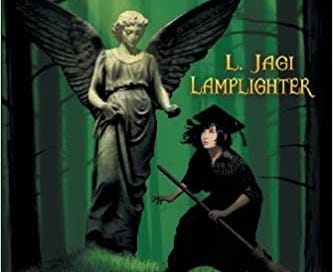The Unexpected Enlightenment of Rachel Griffin by author L. Jagi Lamplighter Wright has been described as Fringe meets Narnia in Hogwarts. The Narnia is easy to see. And it is set at a magical school. But the rest?
Imagine the end of the Harry Potter series. You know, where the school is under full assault, things are blowing up, students are fighting, and great beasts are tramping around?
Imagine that's only the prologue. There's a dragon, and possession, and hordes of the possessed out to slaughter the school. There's even an evil math tutor (Moriarty, anyone?). I was expecting a few lines from Maleficent (the character, not that terrible movie). But it was not to be this time out.
The story
Like all good stories, this has elements of a mystery. (Don't look at me like that. Even Die Hard has a mystery: like "Detonators? What about them?") And The Unexpected Enlightenment of Rachel Griffin wastes no time in setting this up. Chapter one sets up an existential threat to reality, and ends with an attempted murder. The rest of the story takes place over the next five days of the first week of magic school.
And the grand finale is so epic, you're going to wonder why you haven't heard of Rachel Griffin before.
Jagi does so much with so many different things in this, you'd think she has an encyclopedic memory of all of fantasy, and threw them into a blender. And while it looks like a standard "boarding school" story, she jams in so many subplots and stories and character arcs, you'd think it would be cluttered. But she makes it look so easy, you don't realize how much you've read until they try to recap it in the next book.
The characters
Our heroine is Rachel Griffin, 13 years old, a student at Roanoke Academy for magic, in New York. She's English royalty in a new world, with classmates from all over the world. This alone puts it had and shoulders above **the next nearest competitor** (which first treated America as a nonexistent land in the world of magic before turning it into a neo-puritan hellscape in a spinoff film series).
Chief among Rachel's new acquaintances is Siegfried Smith, who comes with a background of a Dickens character, and all the psychology that should come with it. (Oliver Twist is less fiction and more fantasy, orphans in the system aren't that cute.) Siggy is an acquired taste. Then there's the magical princess of magical Australia, who's another oddball.
And then we're off to the races.
The world
The easiest way to review this is to compare it to Harry Potter. It's not fair … to Harry Potter. Don't get me wrong, while I enjoyed the books 20 years ago, the world of Harry Potter was so narrow and confined, you never really got the sense of the larger world. What did it look like? What would it look like?
The nice thing about this is that we get the perspective of someone who lives in the world of magic, excluding the Stranger in a Strange Land effect.
That's right, unlike Rowling, who relied on the tried and true "Alice in Wonderland" variety of dropping an outsider into a new world, make them the primary narrator, and explaining it to the narrator and the reader, Jagi has managed to make a complete world, encompassing every question one might have about how things work. Jagi didn't get to taxes yet, but I almost expect it while reading.
And instead of three primary characters, excluding almost all others (let's face it, Neville Longbottom was a punching bag until he became a sword swinging badass out of nowhere), there are friends and acquaintances all over the place. There are mean girls, certainly, but nothing fits into the nice, neat little boxes that Rowling jammed her characters into. There is no one house of "obviously villainy" here.
Sure, there are plenty of ominous characters. There's a Victor von Dread, who I expect to talk in all caps about Latveria. There's a Salome Iscariot, who worried the heck out of me from the moment she was introduced. The characters are vividly drawn, and deeper than you'd expect.
The politics
This ends up as Christian Fiction. How so? Let's start with Aslan being a character. The serial numbers are ribbed off, but you can still see the impression.
Also, everyone in this school open carries a sidearm. It comes in handy.
Content warning
None. It's really YA. Though as someone once sneered about Narnia, "This is too good for children."
What makes this worth reading?
The short version is that this book is awesome. Lamplighter combines a lot of disparate fantasy elements into something unique and captivating.





The series is utterly DELIGHTFUL. The element that comes through is joy. My rating is six glorious red giant stars out of five!